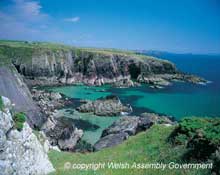 By AD 550 the Saxon advance resumed. A century later, most of what would become England was under Saxon control.
By AD 550 the Saxon advance resumed. A century later, most of what would become England was under Saxon control.
Historians once believed their advance meant the British or Welsh population of England were either slaughtered or driven westwards. This is now considered to be untrue. The vast majority are likely to have stayed where they were, adopting the language and the customs of their rulers.
Their language survives in place-names. Most of the rivers of England have Brythonic names: Avon, for example, derives from the Welsh afon (river). Saxon or English kingdoms were created, the strongest of which, by AD 700, were Northumbria, Kent, Wessex and Mercia.
The early kingdoms of Wales have older roots than do those of England. Gwent, probably the earliest, emerges from Caerwent and probably represents the reassertion of the power of the ruling classes of the Silurians. The rulers of Gwynedd traced their ancestors to Cunedda, traditionally believed to be the leader of the incursion of the Gododdin.
In South West Wales, Dyfed, the land of the Demetae, came under the rule of Irish incomers, as did the kingdom of Brycheiniog. Powys, probably based on the Latin name pagus (hinterland), may have represented part of the territory of the tribe of the Cornovii.
Between AD 650 and 750, lowland Britain became firmly English. Even in southern Scotland, most of the Brythonic or Welsh kingdoms came under English or Anglian control.
Yet before that happened, those kingdoms produced the first surviving body of literature in the Welsh language, in particular the Gododdin of Aneirin.
The English advance pressed particularly hard on Powys. The Heledd poems are a magnificent lament on that kingdom's misfortunes.
On reaching the Welsh mountains, English expansion becames a spent force, a fact which Offa, King of Mercia, recognised. In about AD 780 he ordered the building of a dyke from sea to sea. Offa's Dyke shaped the territory of Wales and would become one of the great engineering achievements in British history.
Source British Broadcasting Corporation
点击查看本频道更多精彩内容